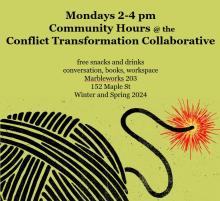Conflict Transformation: A Vital Issue of our Day
In an increasingly fractured world, Middlebury has made a commitment to serve as an incubator for research, teaching, and student experiences to address divisiveness in society. Working with more than 100 partner institutions in the United States and around the world, Middlebury is working to embed principles and practices of conflict transformation in the liberal arts from high school to graduate school.
Conflict is part of the human experience.
Many of us hear the word conflict and think of the stress and harm of “us versus them” dynamics, what Amanda Ripley calls high conflict. This sort of conflict can destroy relationships and communities; other forms of conflict, however, are not just essential but desirable. As John Paul Lederach describes, conflict can be a gift. Conflict helps keep relationships and social structures honest, alive, and responsive to human needs and aspirations.
For scholars, the field of conflict transformation (CT) explores how destructive conflicts can change and become relatively constructive. Importantly, it also involves the study of how people conduct themselves to foster such changes (Kriesberg 2009). The transformations that emerge might happen at the personal level (a change of heart), the structural level (a change in power), or somewhere in between.
As an area of practice, conflict transformation encompasses a wide array of work, from mindfulness and interpersonal relationships to international mediation and peacebuilding. We can each participate in conflict transformation if we start in the places we already inhabit.
The Kathryn Wasserman Davis Collaborative in Conflict Transformation seeks to learn lessons from this vast community that can be adapted to the issues and questions that are most pressing for Middlebury. The work we do—at the College, the Middlebury Institute, Bread Loaf, and Schools Abroad—will help build new networks and expand our ability to transform the world around us.




